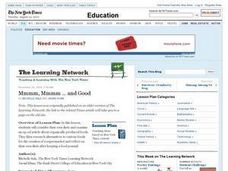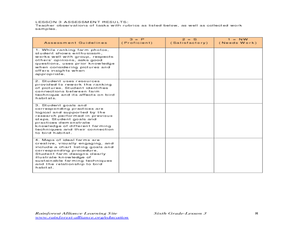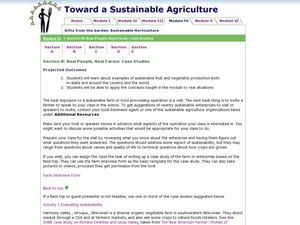Curated OER
What's Organic?
Students discuss background information presented by the teacher and read dictionary definitions for the words "organic" and "synthetic." In this gardengin lesson, students complete a worksheet on the material. Students grow and compare...
PBS
Reading Adventure Pack: Farms
A Reading Adventure Pack features a fiction and nonfiction text—The Oxcart Man by Donald Hall and illustrated by Barbara Cooney and Farming by Gail Gibbons. Following the readings, scholars make a collage showcasing foods farmed from...
Curated OER
Fresh Foods from Farm to Table
Are you a good egg? Learners begin a farm-to-table lesson by acting out verbs in groups to demonstrate the egg production process, and then research the steps using online resources. Several excellent videos are linked through the...
One Hen
Making Choices
When choosing what foods to eat, there are a lot of factors to consider. To help make the decision a little easier, young learners work in small groups developing short plays, stories, or advertisements that address the different issues...
Curated OER
Sustainable Livestock
Learners investigate healthy eating habits by researching livestock. In this food sustainability lesson, students research the negative impact factory farming has on our environment due to pollution. Learners define agricultural...
Curated OER
Why Eat Organic?
Ninth graders explore the concept of organic eating. In this environmental stewardship lesson, 9th graders compare and contrast organic foods with conventional foods and discuss the benefits of eating organic foods.
Curated OER
Slow Food: A Different Path
Students investigate the slow food movement through a reading and activity. In this slow food instructional activity, students read about the differences in fast food and slow food and the ties to sustainable agriculture. They nominate a...
Curated OER
What's Organic?
Learners define and discuss terms organic and synthetic, read article pertaining to organic agricultural practices in Oklahoma, complete worksheet, grow plants using both commercial and organic fertilizer, compare growth rates, and chart...
Learning Games Lab
Nitrogen in Fertilizer
Nitrogen is an essential element for productive farming. An interactive lesson explores the chemical makeup of different fertilizers and their corresponding nitrogen content. The interactive challenges individuals to complete...
Curated OER
Real People, Real Farms: Case studies of organic agriculture
Eighth graders study examples of organic agriculture from around the country. In this sustainable agriculture lesson students apply what they learn to real life situations.
Curated OER
Toward a Sustainable Agriculture
Read about sustainable agriculture and complete related Internet activities. After reading background information about the economics of sustainable agriculture and the problems with the industrial food system, your students click on...
Curated OER
Taming Wild Land
Third graders consider the habitat needs of living things and how extensive farming in an area can affect the plants and animals of a region. They participate in a simulation to show how changing the habitat in one area can greatly...
Curated OER
Genetically Modified Foods in Perspective
Students research the concept of genetically modified foods. The purpose of the research is to increase science content knowledge and comprehension of the controversy surrounding the subject.
Curated OER
Keeping Milk Fresh
Students identify the risks of spoilage and pathogens in fresh milk. They investigate the farmer's role in keeping milk safe to drink and identify safety procedures used in dairy farming.
Curated OER
How Hot is Too Hot?
Fifth graders use the scientific method to conduct experiments on the temperature effects on organisms. In this temperature effects on organisms lesson plan, 5th graders observe and record the hatching or the developing of organisms into...
Curated OER
Toward a Sustainable Agriculture
Your class considers a case study of a sustainable agro-ecosystem and view a PowerPoint presentation about a sustainable farm. They complete a case study worksheet. Extension activities are included.
Curated OER
Little Bees, Big Potential
After reading an article on the alfalfa leafcutting bee, learners chart its characteristics alongside those of the honeybee. Then they draw the leafcutter lifecycle. The article provides fascinating reading when studying the role of...
Curated OER
Genetically Modified Foods
Students explain what genetically modified foods are and how they are created. Students use appropriate vocabulary to describe and effectively discuss the benefits of, and potential risks of, genetically modified foods.
Curated OER
Mmmm, Mmmm ... and Good
Students consider their own diets and examine an op-ed article about organically produced foods. They research alternatives to various foods for the creation of a supermarket and reflect on their own diets after keeping a food journal.
Curated OER
How can my breakfast help the birds?
Sixth graders design farms with a bird's habitat in mind. In this farm lesson plan, 6th graders research how sun grown coffee destroys a bird habitat, and then they make their own farm with a bird's habitat being preserved. They then...
Curated OER
Pizza Farm Activities
Students identify the food groups and agricultural sources of pizza ingredients. They construct a construction paper pizza, identify the crops grown for pizza ingredients, and make and eat English muffin pizzas.
Curated OER
Where Do Your Veggies Grow?
First graders investigate the origins of vegetables. In this Science instructional activity, 1st graders identify where fruits and vegetables come from. Students describe how people utilize plants.
Curated OER
Real People, Real Farms: Case Studies
Students examine sustainable fruit and vegetable production. In this agriculture lesson students apply what they learn to real life situations.
Chicago Botanic Garden
Impacts of Climate Change
Scholars become experts on the eight major impacts of climate change through a jigsaw and grand conversation. They then research and present what they learned about effects specific to their region.























